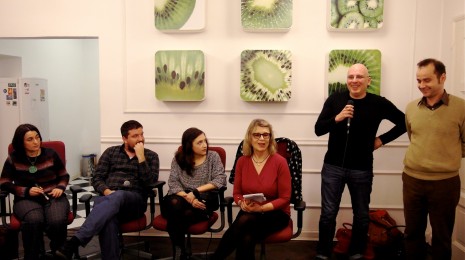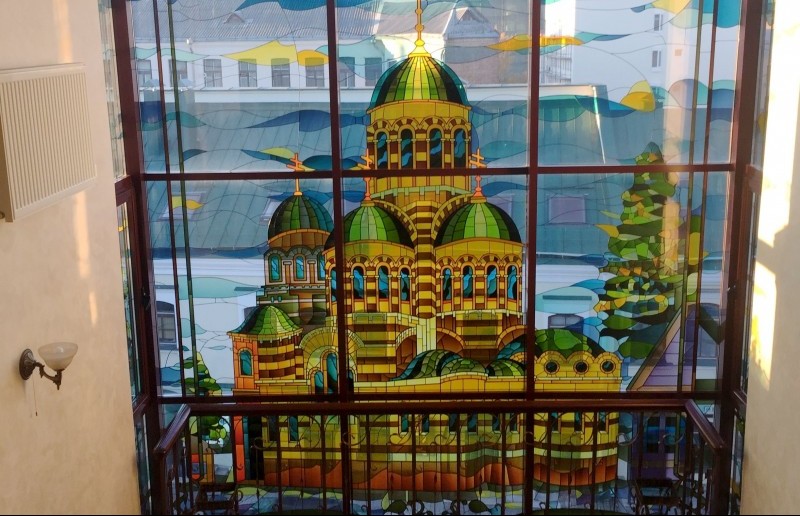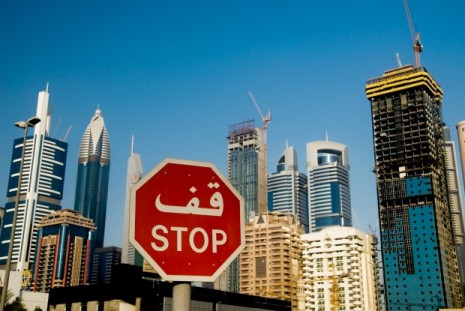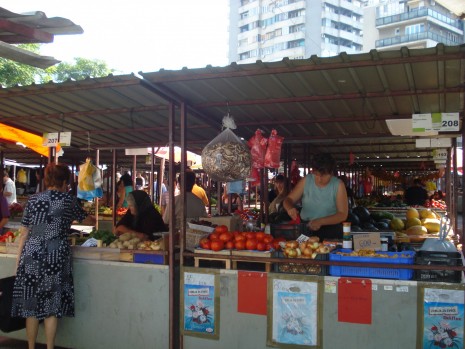
Two cities, two countries united by wars against common enemies, separated by the horrific war when former Yugoslavia fell apart in the 1990s. The countries are Serbia and Bosnia-Herzegovina, the cities Belgrade and Sarajevo, both struggling with financial, social and political problems and still far away from full recovery.
A new round of Global Reporting international Global bars took place in Sarajevo (March 4th) and Belgrade (March 5th). Both events with general support from the Swedish Institute. The common topic for the two bars was: “Cities in transition… to what?” Our partners proposed this theme since unarticulated transformation and deterioration of cities is a hot issue throughout the Balkans.
Global Bar March 4th at Art Kino Kriterion, Sarajevo
Once Olympic city and the pride of “Yugoslav way”, Sarajevo today is a partly scattered city struggling with its near past. Bullet holes and ruins from the four years of Serbian siege in the mid 1990s, with 10 000 civilians killed, could still be seen together with luxury shopping malls. The dominating building is a huge tower covered in glass and built with Saudi Arabian money. Investors that as part of the revenue also can establish new mosques complete with imams from their own Islamic schools. At least that is what we are told.
The Global Bar took place in Kriterion, an art and cultural centre with a young, engaged and urban public located in an old cinema in the centre of Sarajevo. Kriterion has different programs on every evening, ranging from films, concerts, and disco to speed-dating and stand-up comedy.
The interior is a bit ruff and experimental – black walls, pics from different events, cushions and benches to sit on. In the little bar you can get coffee, tea, beer and wine, smoking is allowed. The atmosphere is foggy, generous, and open. Young people are gathered round the small tables, sipping coffee, talking, face-booking, laughing.
When the Global bar started, some 20-25 persons were there to listen and take part in this very first event of this kind in Kriterion. This is a short summary of the debate.
Panel:
Rebecka Gordan, writer and journalist at Arkitekten, the journal of the Swedish Association of Architects and editor for New Urban Topologies, an international urban exchange project by Swedish art centre Färgfabriken;
Ivanka Apostolova, anthropologist and “cultural activist” from Skopje, Macedonia.
Ines Tanovic, from Sarajevo, art historian, journalist and coordinator of the Culture 2020 initiative (an informal network of cultural workers in Bosnia – Herzegovina).
Agneta Carleson, Global Reporting, moderated the discussions, and Predrag Dragosavac, Global Reporting, was executive organizer.
The theme for this Global Bar is Cities in transition – to what? I will start with asking you – what kind of city is Sarajevo?
The story of the city is actually the history of the people who have lived in it, its inhabitants, said Ines Tanovic.
– There is a lot of energy in Sarajevo, especially among the young. But we also have lots of problems, economical, social and political.
– In a normal city, the municipality is engaged in the planning, building and maintaining of the city and involves the public in this planning. But here in Sarajevo this is not the case. Even the national museum is closed, as we cannot agree on what is a common national view of our nation. This is how far it has gone.
– There is a big need for construction – and maintaining work in the city but a huge lack of money for investments. Most of our tax money is used for super modern shopping malls and other even more strange constructions. No one takes responsibility for the situation and than we have all the corruption. This is the reality!
The Bosnian constitution involves a democratic dilemma, the panellists underlined, The Dayton peace agreement, signed in December 1995, that is the base for the political decision-making system, ended three and half year long war in Bosnia. Still, this agreement involves a power-sharing model that in practice makes it impossible for a normal party system to be established (see Dayton Agreement)
Skopje, the capital of Macedonia, has similar financial, political and social dilemmas as Sarajevo – and many other cities in the former Yugoslavian states, Ivanka Apostolova stated. In Skopje, the politicians have decided on a large – scale renewal of the city, involving to cover modernist buildings from the 1970s with facades in neo-classical style and to set up statues of old Kings and historical heroes all around the city.
– It looks quite bizzar. Still, there are no real protest movements, only some occasional antagonism.
– The political opposition is of no help, they do not protest against how the ruling parties are using lots of tax many to transform Skopje into a fake, old fashion city with no memories of our socialistic past.
There are some regulations about citizen involvement in city planning – but as goes for most of the laws and legal systems in Macedonia, these regulations are not respected.
– The local authorities for city planning never involve the citizens in the planning. We have no democratic possibilities to explain what we want, need or think about the future of the city, neither functional nor aesthetic. Another and even bigger problem is the lack of money for investments in good housing, schools, hospitals and other functions that the citizens want.
How the situation in Sweden, compared to what we hear about these Balkan countries?
We have legal procedures for debating and protesting against building plans, and rules for a transparent process, said Rebecka Gordan. But there is no guarantee for a real influence – no public veto against plans that the politicians want to put through. But if at least 10 percent of people living in the neighbourhood of a planned building site sign a protest petition, the case can be taken to court.
Why do people not protest more actively against the city development in Sarajevo and Skopje? Is it dangerous to protest?
– There have been some actions against the building of shopping malls and other big constructions in old city centres. But they all ended by police breaking up occupations, commented Ines Tanovic.
But there are reasons for the lack of engagement in city development issues, she continued.
– We do not have the strength or guts to protest against building projects when we have to fight for our basic human needs every day! Some 50-60 percent of the young in Bosnia-Herzegovina are unemployed. This is by far the most important issue for us young. People do not have energy to engage on a large scale in other issues, however important or meaningful they are.
The situation in Macedonia is very similar, said Ivanka Apostolova.
– The political climate does not encourage discussion among the public. We also have a very high rate of unemployment, and there has been some campaigning for educated youngsters to move out from Skopje to smaller cities where their skills are more needed. In theory this can be a good and useful plan – but corruption and other problems undermine the practice.
During and after the war a lot of educated people emigrated, commented Ines Tanovic.
– As a result, Bosnia-Herzegovina still is a very rural country. The lack of strategy and urban planning is a big problem in all sectors of our society. I once asked our minister of culture about the plans for the next five years. And he just looked at me as if I was a complete idiot. “We don´t have to plan. We just go on – and we will see what happens, he said”.
No responsible Sarajevo politician wanted to take part in the panel tonight. But we can pretend that they are here! What do you want to tell them? Or ask them?
Our basic problem is unemployment and how are you going to solve that, dear Minister. That would be my main question, said Ines Tanovic.
And I would ask them to present the strategic planning of the city development for the next ten years, and a plan for an on going public dialog with the citizens about it, added Rebecka Gordan.
And your best advice to the Minister?
There are good possibilities to develop interesting projects in the city of Sarajevo. We have many abandoned spaces that could be used by and for the people, said Ines Tanovic.
– Why not copy the Netherlands, where empty buildings and spaces are offered to projects with young people, immigrants and other groups.
– Secure the involvement and cooperation of the people in the planning processes, added Ivanka Apostolova.
Finally, can you formulate a vision for the future – and some improvements of that can be carried out in the near future?
– My dream is a comfortable city with a basic infrastructure that is functional for all inhabitants, says Ines Tanovic. A city where there are jobs and opportunities for all, not burdened by unemployment and poverty.
– I also want a political strategy for culture development that would give us 2-3 new concert halls in Sarajevo. And resources for developing and rebuilding our museums in Sarajevo, and to open those that are now closed – as the national Museum. Museums are the memory of the city!
– Those are my dreams, and that is about all we have so far – dreams. Without them I cannot se anything but growing emigration. And that is a very dark and sad vision.
Ivanka Apostolova has a dream about a city where creativity is a dominating feeling.
– I miss places where people can meet and talk, all the cafés and nightlife we had in Skopje back in the 1980s. Today you see nothing of that.
– I also have a dream of opening lots of free spaces in the city where people can grow flowers, vegetables or whatever they want. There are many unused sites that could be suitable for this! I think this is an initiative that can help to lessen the pressure of unemployment and other burdens in my hometown Skopje.
– Unfortunately, everything works ad hoc in my country today. There is no political debate about how we shall deal with the serious problems that we have. Still, I think involvement is possible. The lack of debate is partly a question of self-censorship, not actual censoring by the authorities.
A city must have areas for leisure and recreation, Rebecka Gordan underlines.
– A city needs lots of places where you can do things for free, as libraries where you can have a coffee and read books without paying and culture houses with a lot of free activities. This is what the citizens ask for; they normally do not want more big shopping malls, huge garages and spectacular offices in central areas. It is often the politicians that have these grandiose plans for developing the city.
– In many cities, as Stockholm and Sarajevo, there is a great demand for cheap flats that also young people can afford. This is really an issue for political initiatives!
All over Europe you can see that the individualistic perspective is dominating, and that collective solutions and perspectives are regarded as old fashion – was a last comment from Ines Tanovic.
– This change will have a great impact on our future – but we do not know about the outcome yet.
Global Bar, Belgrade March 5th at the online magazine Belgradian, Resavska 32, Belgrade
Magazine Belgradian is located in a flat in an elegant house from around 1900 in central Belgrade. The decor is fresh and modern, with white painted walls, lime green accents and lots of round paper lamps from Ikea in the ceiling. The reception area has been transformed into a simple bar with snacks and beer, white chairs are lined up for the audience, about 35-40 people.
Panel
Rebecka Gordan
Ivanka Apostolova
Marko Aksentijevic, from Belgrade, leading initiator and a member of several collectives involved in the development of the city and citizens participation in urban development. Marko is also known as “The minister of space”.
Agneta Carleson, Global Reporting, moderated the discussions, and Predrag Dragosavac, Global Reporting, organized the event.
Belgrade was destroyed and rebuilt more than 40 times through history. It is in transition now – from a post war, post socialist situation to…..what?
– There are lots of challenges, said Marko Aksentijevic.
– Today, there is a total lack of urban planning. The situation is chaotic. Or what to say about a city centre with houses built on top of other buildings without building permission, There are also other illegal dwellings all around the city. And the politicians just close their eyes!
– People do not feel that the politicians are there to listen to us or to put through what we, the voters, find important. Therefore, it doesn´t make sense to many of us to organise and protest against decisions that we find absurd or dislike.
– But I myself, I am a born optimist and think there is a lot to be done.
And Ivanka how is the situation in Skopje?
– In Skopje, most discussions are about the project ‘Skopje 2014’. It was initiated in order to renovate the city and started with a lot of enthusiasm.
– But the outcome was not at all what we expected. Instead of a process where we, the public, could take part and present ideas and visions, the politicians have carried out their own vision: a traditional, old fashioned city where the traces of the Yugoslavian period are more or less removed.
– One example: in order to renew our parks and open spaces, lots of big, new monuments of old mythological rulers have been erected. And they have covered buildings from the 1970th with columns and other faked facades in Neo classical style, in order to make them look old. It is quite bizarre!
– I appreciate some of the changes, but there is no respect for the city and the people who live in it.
In Stockholm there was a lot of housing built in the 1960s and 70s. Now its time to renovate that and there are some problems, Rebecka.
– Yes, in Sweden we have the million housing project built 1964-1973 that now is all up for renovation. But many of these suburban areas have become very popular over the years. And when they are renovated, the rent becomes much higher – sometimes even doubled. As a consequence, lots of tenants cannot afford to stay and are forced to find other, cheaper flats.
What are the legal possibilities for people to influence the city dwelling processes in your countries?
– Well… in theory, there is some kind of legal opportunities for public influence. But when you look at the practice it never happens. That is the general rule, said Marko Aksentijevic.
– One of our main challenges now is the building of ‘Waterfront’ by the river, a business and shopping area of huge proportions that will change the view of the city in a dramatic way and cost lots of tax money and investment capital. And it is not what the public needs or asks for – we need decent housing, places for culture and meetings, improved infrastructure etc etc.
– Even if we try to protest about the Waterfront plans, we know that in the end the show must go on. And in the final outcome our influence is going to be very futile.
– If there was a real will among the political structure to listen to the public, they would say: “Let us go back and discuss what really needs to be done in this city.” But this will not happen!
There is a need for investments in all parts of the former Yugoslavia – but no money. In Sarajevo and several other cities, Saudi money is invested in big shopping malls, but people want housing and improved transportation.
– The primary dilemma is not where the money comes from, but what you do with them; what do we want to build and what city we want to live in?, Marko said.
– A luxury port area like the Waterfront project in the city centre would not put Belgrade on the world map. Neither would new luxury tourist hotels. Nothing of that is acceptable. What we need is an infrastructure that works, a Belgrade underground for example and, above all, some planning to organize the future development of the city.
We also have foreign investment in the city, but more from western Europe and Israel, Ivanka Apostolova comments.
– A big problem is that our local government is selling property and land for almost nothing.
– In the Netherlands, there is a rule that when public sites for building are for sale, it is not a competition about who can pay the highest prize. Instead, the competition is about the best idea on how to use the site. This I find is a really good rule that should be implemented also in Sweden – and in all cities, adds Rebecka Gordan.
After the fall of the Berlin wall, Berlin has transformed into a very trendy and creative city. Can Berlin be an inspiration for Belgrade?
– I cannot see that there is a new Berlin in the pipeline for Belgrade. The development of Belgrade is dependant on our politicians, views from planning experts and the demands from the public. No one knows yet what this mix will result in. It is up to us all to take part in shaping the future.
Thank you for participating in this Global Bar, both the panel and the audience, Agneta Carleson concluded.
– I hope you enjoyed both the discussion and the atmosphere.
– And I want to quote what Nelson Mandela once said: “It is not the case that discussions in a society lead to democracy. It is the discussions that are democracy!




